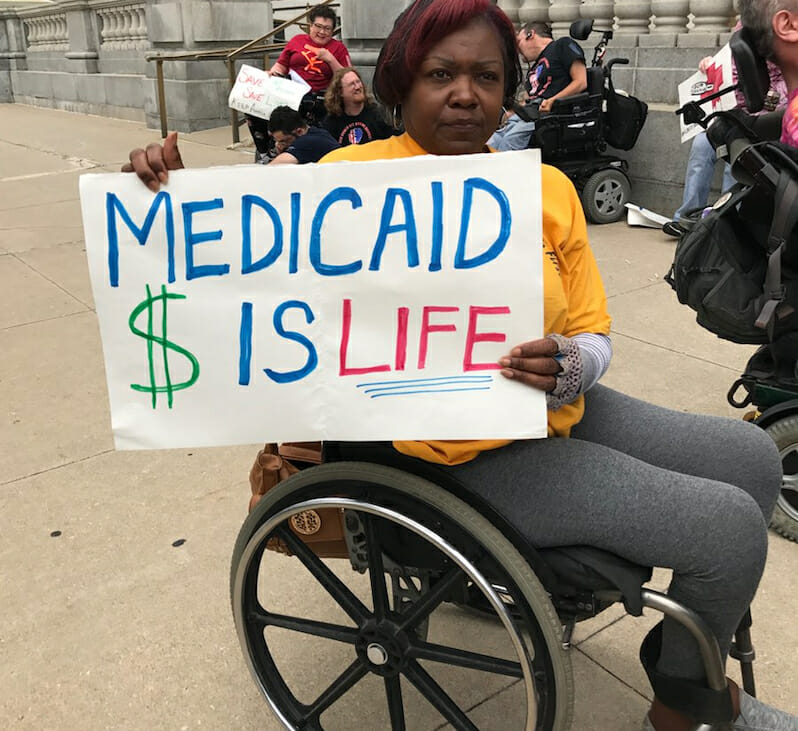Here’s How Republican Lawmakers Are Responding to Medicaid Advocates
Disability rights activists protesting the proposed GOP health care bill’s cuts to Medicaid are being met with slammed doors and, in some cases, police force. A disability rights activist outside Republican Sen. Todd Young's office in Indiana in June. (ADAPT / Twitter)
A disability rights activist outside Republican Sen. Todd Young's office in Indiana in June. (ADAPT / Twitter)
A disability rights activist outside Republican Sen. Todd Young’s office in Indiana in June. (ADAPT / Twitter)
With the mainstream media’s current hype over the Trump administration’s alleged ties to Russia, it’s easy to forget the litany of issues under threat from the Republican-led Congress. The GOP health care bill is perhaps at the top of that list. Scores of disability rights activists are turning up around the nation to protest potential cuts to Medicaid but have been met with stony silence from their representatives and, often, arrest.
A refresher: The GOP’s effort to repeal and replace the Affordable Care Act (ACA), a prominent campaign promise from many Republicans re-elected in November, is not going well. After the House passed a bill that would reportedly kick 23 million people off health insurance, the Senate was put in a tough position, and senators haven’t been able to agree on common ground. The Congressional Budget Office (CBO) analysis of the Senate health care proposal, the Better Care Reconciliation Act (BCRA), was hardly better: The numbers show 22 million people losing insurance by 2026.
Senate Majority Leader Mitch McConnell delayed the Senate’s August recess in the hopes of finally passing health care legislation, and he told reporters on Tuesday that a revised version of the BCRA could be rolled out as early as Thursday.
Throughout the congressional scramble over a new health care bill, disability rights activists have been vocalizing their concerns over potential cuts to Medicaid. Under the BCRA, cuts to Medicaid would be even deeper than under the House’s initial health care plan.
“In the first 10 years, Medicaid funding would drop 26 percent from the CBO’s projected baseline,” The Washington Post reports. “In the 10 years after that, 35 percent.”
In late June, 43 activists were arrested outside McConnell’s Capitol Hill office during a “die-in” intended to showcase the fatal effects of Medicaid cuts.
Advocates weren’t deterred, however, and a second spate of protests unfolded early this week. On Monday, 80 disability rights activists were arrested for protesting outside Senate and House offices, as staffers laughed:
Republican staffers stuck behind the perimeter watching this scene and laughing pic.twitter.com/RPSRTDAMuV
— Jeff Stein (@JStein_Vox) July 10, 2017
More laughs after this pic.twitter.com/yWJ3rd9p0S
— Jeff Stein (@JStein_Vox) July 10, 2017
Activists also visited the Republican National Committee (RCN) headquarters in Washington. The lack of response from RNC staffers was documented by activist Bambi Polotzola on Facebook:
Disability advocates have been outside of the Republican National Committee office for several hours. RNC staff locked the doors as soon as they saw the moms pushing their children in wheelchairs up the ramp to the front door. Through the door, a mom politely told them that she was a republican and asked for them to allow a couple of people in to discuss how the proposed republican senate healthcare bill will affect people with disabilities. During the time waiting outside, people on the inside could be seen looking out the windows laughing. No one from the RNC spoke to any of the disability advocates and they called the police.
Protesters have been met with similar scorn around the nation. Disability rights advocates aren’t only flocking to Washington, but turning up in state capitols in droves in an attempt to get their senator or representative’s attention.
Last Friday demonstrators visited Ohio Sen. Rob Portman’s office in Columbus and were met with police:
According to Esquire, the woman being “casually pushed out of her chair and onto the floor” is 35-year-old Alisa Grishman, who suffers from multiple sclerosis and other ailments. The video has been shared on Facebook almost 6,000 times.
Last Thursday, activists gathered outside Colorado Sen. Cory Gardner’s office in Denver, just one week after a 57-hour sit-in in Garner’s office ended in nine arrests.
On June 30, dozens of activists marched outside the offices of Mississippi Sens. Thad Cochran and Roger Wicke, chanting “Hey hey, ho, ho, this health care bill has got to go.”
“Living with a disability costs money. If you cut my insurance, I don’t know what I would do,” Cindy Singletary of Biloxi, Miss., said during the march.
On June 28, a handful of protesters went to Milwaukee’s Federal Courthouse in an attempt to voice their concerns to Wisconsin Sen. Ron Johnson.
“Our point here is to not be arrested. We would’ve been perfectly fine with a conversation,” resident Gregg Beratan said after he and other demonstrators were removed from the courthouse. “We’d rather go to jail than die from lack of Medicaid.”
Many of these demonstrations have been organized by ADAPT, a grass-roots organization for disability rights that promotes nonviolent direct action. “Without these services many disabled and elderly Americans will die,” ADAPT organizer Mike Oxford said of Medicaid in a recent press release. “We won’t let that happen.”
During the July 4 break, numerous senators reportedly retracted their support for the bill. “The original Republican opposition to the repeal bill was led mainly by senators from states that have expanded their Medicaid programs under the Affordable Care Act, providing coverage to millions of people who had been uninsured,” The New York Times reports. “Now senators from largely rural states, where hospitals stand to lose millions of dollars under the bill, are expressing concerns.”
The protests aren’t likely to end anytime soon. Take, for example, these Illinois-area mothers of children with disabilities who are flying to Washington to join the demonstrations.
“Medicaid has been a lifeline for [my daughter],” one mother told local news channel WREX. “I do not know where I would be if [she] did not have it.”
Your support matters…Independent journalism is under threat and overshadowed by heavily funded mainstream media.
You can help level the playing field. Become a member.
Your tax-deductible contribution keeps us digging beneath the headlines to give you thought-provoking, investigative reporting and analysis that unearths what's really happening- without compromise.
Give today to support our courageous, independent journalists.






You need to be a supporter to comment.
There are currently no responses to this article.
Be the first to respond.